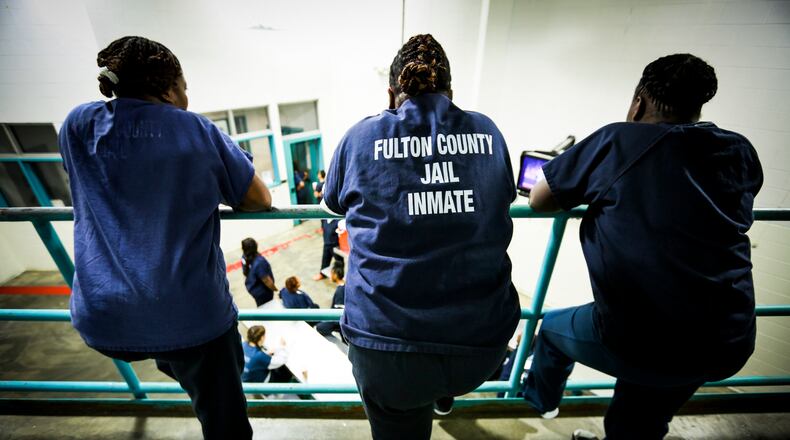This was posted on Tuesday, February 28, 2017 by Rodney Ho on his AJC Radio & TV Talk blog
Participants voluntarily submit themselves to variations of physical and mental torture on TV shows such as "Naked and Afraid," "Alone" and "Survivor."
A&E's "60 Days In," which has shot seasons three and four in Fulton County Jail, can create its own hellish trauma by replicating an experience millions deal with any given year: getting arrested and being thrown in lock up. For season three, nine innocent people spent up to two months in jail last fall with actual prisoners for a variety of reasons: empathize with a spouse who is an ex-convict, a desire to reform what they see is a broken system or perhaps buff a resume for a future law enforcement job.
And when the promos say these seasons will be bigger and badder than those in Indiana's Clark County Jail seasons one and two, they weren't exaggerating.
Fulton County Jail is five times larger than Clark County's jail, with 2,500 prisoners at any one time. Gangs are rampant in Atlanta. The male inmates have to stay in their cells with one other person 15 to 19 hours a day compared to an open space 24/7 in Clark County. Throw in the mix of fistfights, boredom, power struggles, mental illness and drugs and the environment is fraught with danger. Inmates - aware cameras were installed for an unnamed TV show - are rightly paranoid of "snitches."
The docuseries, which averaged 2 to 2.4 million viewers the first two seasons last year, comes back Thursday night at 9 p.m. for a third season. The fourth season at the same facility with different participants will likely air later this year.
Mark Adger, the chief jailer who oversees Fulton County Jail, agreed to allow cameras into his facility. When he took over the jail in 2011, he entered a significantly worse situation. According to stories by my AJC colleague Rhonda Cook, the jail in the 2000s was "often so overcrowded, inmates slept on floors, so unsanitary that raw sewage flooded cells, so unsafe that inmates could wander about because of faulty locks."
After an inmate filed a lawsuit in 2004, a judge ordered federal oversight of the jail. Once Adger took over, with a massive influx of money, he was able to hire enough staff, reduce overcrowding and install proper locks. A federal judge freed the jail of federal control in 2015.
Nonetheless, Adger understands he is taking a major risk exposing his jail to public scrutiny. But he believes this will drive innovation: "This is way out there when it comes to risk taking. I'm getting toward the end of my career. I decided this would be the only way to perhaps shock us out of any complacency we had settled in. We have been staying out of the news in a negative way."
He watched the first two seasons in Clark County and liked the positive reforms the program inspired. He also gave kudos to Sheriff Jamey Noel. "He was willing to expose himself, warts and all," Adger said. "We need to get our heads out of the sand. We throw people in jail. Then we forget about them. This brings a certain aspect of jail operations to the public's attention."
In the end, Adger said he got something out of each participant: "Anyone who takes two months out of their lives to spend in jail when they don't have to earns my respect and admiration."
Executive producers for the show said despite the fact things turned out well for Clark County, most jails nationwide still said no way to their inquiries. Executive producer Gregory Henry, who had done an episode of a previous show "Hard Time" at Fulton County Jail before, was surprised that a jail of this size and scope would want to work with them. "But once I sat down with Colonel Adger, it started to make sense," he said.
Adger, though he has yet to see the show itself, has no regrets. "It was absolutely worth it," he said. "If I could do it again, I would."
Not that he didn't worry during shooting that something godawful would happen and would be captured on camera. "I wondered if I might have to leave the country after this," he joked. "I think I'll stick around."
Credit: Rodney Ho
Credit: Rodney Ho
As a cover, the show producers told staff that they were producing a documentary of prison life in a broad sense. Only a handful of the Fulton County jail management knew what was really going on.
The fact seasons one and two had already aired by the time the cameras arrived last fall at Fulton County did arouse suspicions among inmates and officers, executive producers acknowledged. But executive producer Jeff Grogan said when they did the "big reveal" to staff, only two of the 100 employees at the meeting raised their hands when asked if they thought it was "60 Days In" the whole time.
The show installed 26 cameras and 112 microphones in three locations: two for the men's side in Northwest Atlanta and a third for the women at the South Annex in Union City. They had staff tracking the jail 24/7 for two months and since this was supposed to be a documentary about the jail itself, they interviewed far more inmates beyond the nine fakers. They purposely cast participants who lived far from Atlanta to minimize the chances someone might know them.
The publicity team placed one of the cast members on the phone with me but wouldn't reveal his full name for his protection. "If this show does one thing, I would hope it would teach people to stop breaking the law and go to a horrible place like this," said Nate, a former U.S. Marine who is seeking a job as a Fish & Wildlife enforcement officer.
A Floridian, he created a cover story involving coming to Atlanta to take back stolen family jewelry from an ex-girlfriend. Her new boyfriend supposedly got into a tussle with him and called the cops.
Adger said most participants did a good job keeping their cover stories intact but "some got a little ahead of themselves of full of themselves."
Credit: Rodney Ho
Credit: Rodney Ho
Unlike Clark County, the racial makeup of Fulton County Jail is about 85 percent African American. Nate, who is white, said he felt like a serious minority. "Wow, I'm all alone right now," he said to himself. "I literally looked around to find another white person. That was definitely a shell-shock moment. I had to work a little harder to get into the inner circles with these guys."
Nate hoped he was able to provide Adger with quality intel for him to improve the jail, pointing out good guards and bad guards and unique ways inmates were sneaking in contraband. "What I learned in there is going to have a huge impact on that county," he said. "It's going to have a huge impact on me as well."
Even after his experience, he still believes jail is too easy on its inmates. "All these guys know each other," he said. "It's like one big hang-out party."
Grogan said the fact the inmates are isolated with roommates 15 hours a day made for more intimate story telling. "We embraced that as a creative challenge," he said. Indeed, 29-year-old Nate said he got to spend quality time with a smart 20 year old who needed a serious lift to his self worth. "I felt like I was a positive mentor," he said.
Amazingly, most inmates were okay having their faces on camera. "Jail is a really boring place," said Greg Henry, another executive producer who came up with the show's concept and is co-president of Lucky 8 TV. "I've worked in a lot of correctional facilities. People will jump at the chance to break up the monotony."
Plus, Henry added, "a lot of the guys don't feel they have a voice and want to be heard. We are completely objectively and we'll listen to what they have to say. They're thankful for that opportunity."
Credit: Rodney Ho
Credit: Rodney Ho
Henry said the appeal of the show lies in the way the participants are like "avatars" for the viewer.
Leigh Chessor, a 66-year-old Hiram home maker, said she and her husband found the show addictive. "It was so interesting to watch how each participant handled the stress being locked up with criminals as well as the fear of exposing who they are," she wrote on Facebook. "What I got out of it: I am never going to do anything that would land me in the slammer!"
TV PREVIEW
"60 Days In," 9 p.m. Thursdays, starting March 2, 2017, A&E
About the Author
Keep Reading
The Latest
Featured







